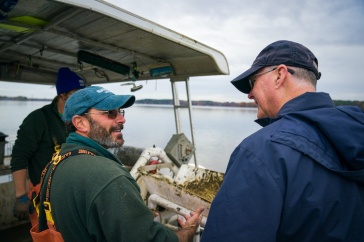
The UNH Library recently wrapped up a massive multi-year project that digitized and organized all known annual reports for every town in New Hampshire, an undertaking that essentially reached every municipality, past and present, throughout the state.
The New Hampshire City and Town Annual Reports Collection now boasts 35,491 volumes, including more than 20,000 added during the most recent blitz that began in 2021 thanks in part to a grant from the New Hampshire State Library.
When that portion of the project began, 20 of the 234 New Hampshire cities and towns were not represented in the digital collection. All 20 of those towns were added during the recent push, as was content from an additional eight village precincts and two extinct towns.
Given the reach throughout the entire state the project aligns perfectly with Embrace New Hampshire, one of four strategic priorities UNH President Jim Dean outlined for the university in January of 2019.
“We have touched every town in the state, including some towns that don’t even exist anymore, and that is going to have some really lasting impacts on our reputation as an institution that reaches out to New Hampshire,” Eleta Exline, scholarly communication librarian?and the principal investigator on the project, says.

The completion of the project was more than 10 years in the making, as the library performed an initial wave of digitizing reports years ago. But the recent grant provided the momentum to push things across the finish line, creating a repository that should prove beneficial even beyond the borders of the state.
“A project of this magnitude takes many partners and many years to come together, and we were honored to work with the New Hampshire State Library with funding from the U.S. Institute of Museum and Library Services, as well as with the Internet Archive, to digitize these historical records,” Tara Fulton, dean of the UNH Library, says. “Now anyone can go to the internet and visit the UNH Scholars Repository to browse New Hampshire town reports, and they can also search for specific information by year or by topic. That’s what libraries do – we collect information sources, preserve them, and use the latest technologies to make them accessible.”
Adds Kimberly Sweetman, associate dean of the UNH Library: “While the UNH library’s primary mission is to support the research and learning needs of our campus community, it’s also important for us to serve the citizens of New Hampshire. We are also providing a rich resource to researchers all over the world.”
The project called for making accessible all known annual reports from the UNH Library and New Hampshire State Library collections. As a result of the grant, a total of 20,606 volumes were added since 2021, including 18,879 volumes that were scanned and 1,727 retrieved from city and town websites, a process that was not without significant manual labor.
The library collected and organized the reports, then prepared them for scanning that was performed at the Internet Archive scanning center at the Boston Public Library, meaning all reports had to be driven from the New Hampshire State Library to the UNH library, before being inventoried, wrapped and shipped to Boston, where they were given a unique bar code.
From there, every page was scanned – manually – and bundled into individual PDFs for each volume. UNH student workers would then download the volumes, create descriptive records and upload them to the university archives.
More than 1 million pages were scanned.
The team working on the project included library staff and students, as Exline and Sarah Stinson, digital collections coordinator at the UNH Library, spearheaded a mission that also featured Nikki Hentz, Scholars’ Repository coordinator, Elizabeth Slomba, university archivist, and Emeline Dehn, archives and special collections manager, as well as Angela Constantian ’21 and Sophia Zydel ’22, who began as work-study students while attending UNH.
Student assistants Molly Gearhart ’24, Ella Truesdale ’23, Jake MacInnis ’24, Grace McNally ’23 and Melissa Bauer ’23G all contributed, as well.

“All of us were touching this material multiple times during the process to make sure everything was being done the right way,” says Stinson. “This was a great project that really pushed me as a project manager – at times it was a big, confusing puzzle. I’m excited to see how people use it. The ways it can be utilized are pretty limitless.”
The digitized reports are a vital resource for town clerks, in particular, Stinson noted, as they often need quick access to historical town data. Stage agencies, such as the New Hampshire Department of Health and Human Services, have also benefited from easy access (a usage dashboard has been created to map those accessing the materials, with DHHS recording more than 2,000 downloads.)
In totality, the collection provides a digital record of each town’s unique history as told through budgets and vital statistics. Even the covers of some of the reports offered enlightening glimpses into the past, Stinson said, as changes in fonts, styles and imagery distinctly represented different eras.
The collection isn’t done growing, either. The library will reach out to all the town clerks and provide access to a digital drop box, so they can continue adding PDFs when each new annual report is available.
“UNH is really the only library in the state in a position to be able to launch this kind of collection, and certainly the only public institution library with the systems and people in place to be able to do this kind of project,” Exline says. “It highlights our role as a library that functions as a resource for the university but also in many ways for the public.”
-
Written By:
Keith Testa | UNH Marketing | keith.testa@unh.edu



















































